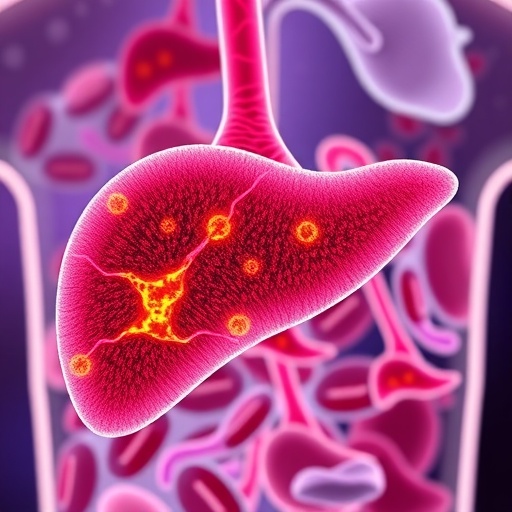In recent years, researchers have made significant strides in understanding the complexities surrounding hepatocellular carcinoma (HCC), a major form of liver cancer that poses a considerable health threat worldwide. A groundbreaking study conducted by Liao, Lin, Shen, et al. delves into the intricate relationship between ether-lipid accumulation and the progression of HCC, particularly in the context of peroxisome proliferator-activated receptor alpha (PPARα) deficiency. This multifaceted study not only sheds light on the biochemical pathways involved in the disease but also highlights potential therapeutic avenues that could emerge from a deeper understanding of lipid metabolism in hepatic tissues.
Ether-lipids, a lesser-known class of lipids, are increasingly recognized for their role in various cellular processes. Unlike traditional phospholipids, ether-lipids contain an ether bond within their structure, which confers unique physical and chemical properties. These lipids are involved in signaling pathways and the maintenance of cellular integrity. Their accumulation in the liver, particularly during the progression of liver diseases such as HCC, merits serious investigation. The link established in this study raises important questions about the biological implications of ether-lipid accumulation, particularly in PPARα-deficient contexts.
The study’s authors indicate that a deficiency in PPARα—an important transcription factor that regulates fatty acid metabolism—can lead to a perturbation in lipid homeostasis within the liver. This disruption not only affects normal liver function but also creates an environment conducive to tumorigenesis. The research employs sophisticated methodologies to analyze lipid profiles and gene expression, paving the way for novel insights into how alterations in lipid metabolism could contribute to cancer progression. Through a combination of in vitro and in vivo experiments, the researchers present compelling evidence that supports the idea that PPARα deficiency leads to heightened levels of ether-lipids and, consequently, increased HCC cell proliferation.
Interestingly, the investigation details that elevated ether-lipid levels may activate specific oncogenic pathways that further exacerbate liver cancer progression. For instance, the study identifies several key signaling cascades influenced by ether-lipid accumulation. By elucidating these pathways, the authors provide a clearer understanding of how lipidomic changes can act as drivers of cancer. This knowledge is not only crucial for understanding the etiology of HCC but also holds promise for developing targeted therapies aimed at reversing the metabolic dysregulations associated with liver cancer.
Moreover, the study highlights the potential of lipid-based interventions in the clinical management of HCC. By targeting ether-lipid metabolism, researchers could develop novel therapeutic strategies that re-establish normal lipid homeostasis. This approach reflects a paradigm shift in cancer biology, where the focus on genetic and epigenetic factors is complemented by a renewed interest in metabolic processes. The implications of such a strategy are profound, especially considering the increasing recognition of the role of metabolism in cancer progression and treatment resistance.
The researchers also emphasized the importance of animal models in their study. Utilizing genetically modified mice incapable of expressing PPARα, the team was able to observe in real-time the effects of ether-lipid accumulation on liver tissues and tumor development. This model provided critical insights that would have been impossible to glean from studies relying solely on human cell lines. The findings from these animal experiments support the hypothesis that targeting ether-lipid metabolism could yield substantial benefits in curtailing HCC development.
In light of their findings, the researchers call for a reevaluation of therapeutic approaches aimed at liver cancer. Conventional strategies often focus on cytotoxic therapies that primarily target tumor cells, resulting in undesirable side effects and recurrence. By shifting the focus to the metabolic underpinnings of HCC, researchers can explore innovative avenues that could lead to more effective and less toxic therapies. This kind of metabolic intervention could also extend beyond liver cancer, as it may have implications for other malignancies characterized by metabolic dysregulation.
As the study makes clear, the accumulation of ether-lipids is not just a byproduct of liver dysfunction; it is intrinsically linked to the molecular mechanisms driving HCC. The relationship between lipid metabolism and cancer is complex and warrants further exploration. Future research directions may include the investigation of ether-lipids as potential biomarkers for HCC progression, as well as examining their role in therapy resistance. This opens up numerous avenues for pharmacological intervention that harness the unique characteristics of ether-lipids.
Finally, the importance of interdisciplinary collaboration in cancer research cannot be overstated. The integration of lipidomics, molecular biology, and clinical insights has enabled a more holistic approach to understanding the complexities of liver cancer. As researchers delve deeper into the interplay between ether-lipids and HCC, it becomes increasingly evident that a multifaceted strategy will be essential in addressing this formidable disease.
The implications of Liao et al.’s research are far-reaching, signaling a new era in our understanding of hepatocellular carcinoma. By bridging the gap between lipid metabolism and cancer biology, the study paves the way for innovative and effective therapeutic strategies. As we continue to unravel the complexities of cancer, the potential for targeted interventions based on metabolic profiles represents a promising frontier in the fight against HCC and possibly other cancers. As years go by and research progresses, the hope remains that future findings will further elucidate the intricate relationships between metabolism and cancer, ultimately leading to improved outcomes for patients suffering from hepatocellular carcinoma.
Subject of Research: Ether-lipid accumulation and hepatocellular carcinoma
Article Title: Ether-lipids accumulation promotes hepatocellular carcinoma progression linked to PPARα deficiency.
Article References: Liao, PY., Lin, WJ., Shen, PC. et al. Ether-lipids accumulation promotes hepatocellular carcinoma progression linked to PPARα deficiency. J Biomed Sci 32, 89 (2025). https://doi.org/10.1186/s12929-025-01178-y
Image Credits: AI Generated
DOI: 10.1186/s12929-025-01178-y
Keywords: Hepatocellular carcinoma, ether-lipids, PPARα deficiency, lipid metabolism, cancer progression.




